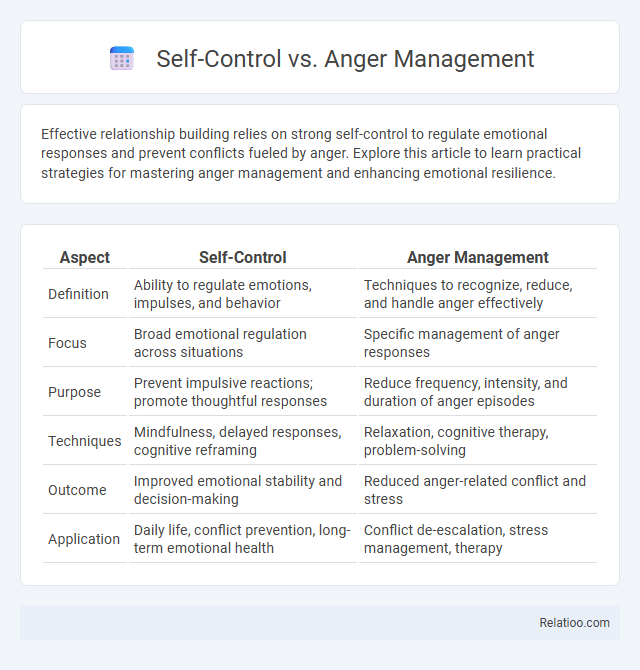Effective relationship building relies on strong self-control to regulate emotional responses and prevent conflicts fueled by anger. Explore this article to learn practical strategies for mastering anger management and enhancing emotional resilience.
Table of Comparison
| Aspect | Self-Control | Anger Management |
|---|---|---|
| Definition | Ability to regulate emotions, impulses, and behavior | Techniques to recognize, reduce, and handle anger effectively |
| Focus | Broad emotional regulation across situations | Specific management of anger responses |
| Purpose | Prevent impulsive reactions; promote thoughtful responses | Reduce frequency, intensity, and duration of anger episodes |
| Techniques | Mindfulness, delayed responses, cognitive reframing | Relaxation, cognitive therapy, problem-solving |
| Outcome | Improved emotional stability and decision-making | Reduced anger-related conflict and stress |
| Application | Daily life, conflict prevention, long-term emotional health | Conflict de-escalation, stress management, therapy |
Understanding Self-control and Anger Management
Understanding self-control involves recognizing your ability to regulate impulses, emotions, and behaviors to achieve long-term goals. Anger management focuses specifically on techniques to identify triggers, reduce emotional arousal, and respond to anger in constructive ways. Developing strong self-control enhances your capacity to manage anger effectively, leading to improved emotional regulation and healthier interpersonal relationships.
Key Differences Between Self-control and Anger Management
Self-control involves regulating your impulses, emotions, and behaviors across various situations, while anger management specifically targets controlling anger and preventing aggressive reactions. Anger management techniques are subsets of self-control strategies, emphasizing coping mechanisms to reduce anger intensity and expression. Understanding these key differences helps you apply appropriate methods for maintaining composure in diverse emotional contexts.
The Science Behind Self-control
The science behind self-control reveals it as a cognitive process regulated by the prefrontal cortex, responsible for overriding impulses to achieve long-term goals. Research links strong self-control with better emotional regulation, distinguishing it from anger management, which specifically targets controlling anger responses. Neuroimaging studies show that techniques improving self-control also enhance the brain's ability to manage anger, suggesting overlap yet distinct mechanisms between general self-control and anger-focused strategies.
Psychological Foundations of Anger Management
Self-control is the cognitive ability to regulate impulses and emotions, serving as the psychological foundation for effective anger management strategies. Anger management techniques focus on recognizing triggers and employing self-control skills to modulate emotional responses and prevent aggressive behavior. Your success in managing anger depends on strengthening self-control through mindfulness, cognitive restructuring, and adaptive coping mechanisms.
The Impact of Self-control on Emotional Health
Self-control significantly enhances emotional health by regulating impulsive reactions and reducing the frequency of anger outbursts, leading to improved mental well-being. Effective self-control mitigates stress and anxiety, fostering resilience against emotional disturbances and promoting stable mood regulation. Strengthening self-control mechanisms contributes to healthier relationships and overall psychological balance by allowing individuals to manage anger constructively.
How Poor Anger Management Affects Relationships
Poor anger management leads to frequent conflicts, eroding trust and communication within relationships, which hampers emotional intimacy and stability. Inadequate self-control during angry episodes intensifies misunderstandings and fosters resentment, causing long-term damage to personal and professional connections. Developing effective anger management techniques enhances self-control, promoting healthier interactions and stronger bonds.
Techniques for Strengthening Self-control
Effective self-control techniques include mindfulness meditation, cognitive restructuring, and delay tactics that help individuals resist impulsive reactions and maintain emotional balance. Anger management strategies often overlap with self-control methods by emphasizing deep breathing exercises, recognizing anger triggers, and developing alternative responses to aggressive impulses. Strengthening self-control requires consistent practice of stress reduction, goal setting, and self-monitoring to improve regulation of emotions and behaviors.
Effective Strategies for Anger Management
Effective strategies for anger management prioritize your ability to recognize triggers and implement self-control techniques such as deep breathing, cognitive restructuring, and time-outs to prevent emotional escalation. Unlike general self-control, anger management specifically focuses on transforming reactive responses into constructive actions through mindfulness and communication skills. Incorporating these targeted methods enhances your emotional regulation, reducing the frequency and intensity of anger episodes.
Integrating Self-control and Anger Management in Daily Life
Integrating self-control and anger management in daily life enhances emotional regulation by enabling you to recognize triggers and respond thoughtfully instead of reacting impulsively. Practice mindfulness techniques combined with cognitive restructuring to strengthen your ability to pause, assess situations calmly, and choose constructive responses. Developing these skills together reduces stress, improves relationships, and fosters long-term personal resilience.
Choosing the Right Approach for Personal Growth
Effective personal growth requires distinguishing between self-control, anger management, and self-discipline, as each targets different emotional and behavioral challenges. Self-control involves regulating impulses and desires broadly, while anger management specifically addresses recognizing and redirecting anger triggers to prevent destructive reactions. Tailoring strategies to individual needs--such as mindfulness for impulse control or cognitive-behavioral therapy for anger--ensures more sustainable development and emotional resilience.

Infographic: Self-control vs Anger Management
 relatioo.com
relatioo.com